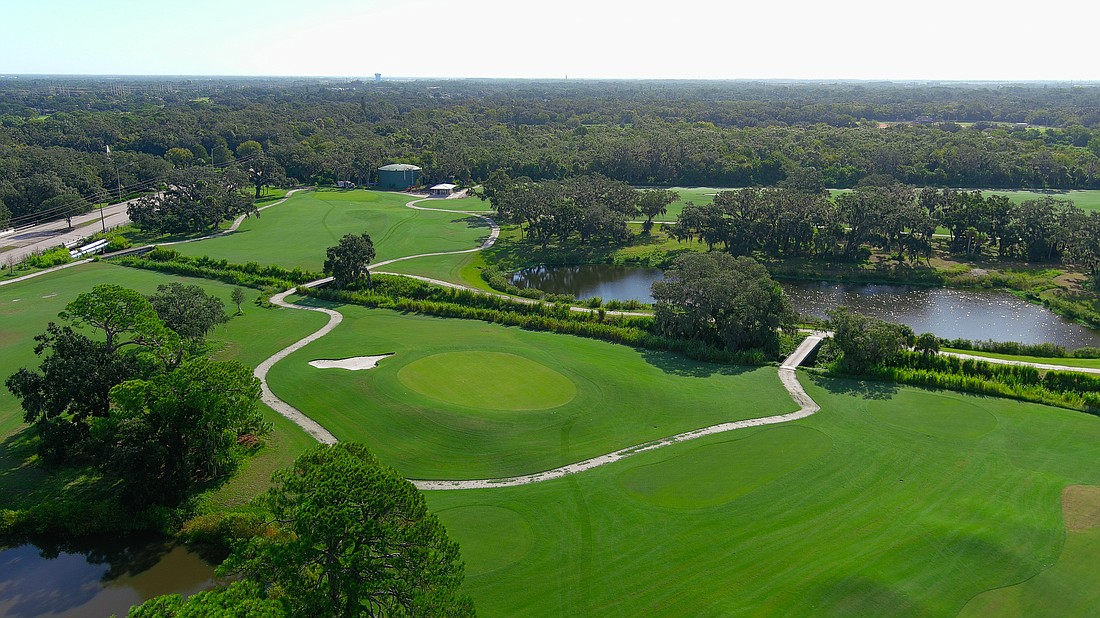- July 10, 2025
-
-
Loading

Loading

Eight months removed from its grand opening, the Bobby Jones Golf Club is projecting self-sustainability through the end of fiscal year 2025, even banking an additional $290,000 into its fund balance.
During last week’s Sarasota City Commission budget workshop, city staff reported that the city-owned golf complex is projected to earn revenues of $4.1 million against expenses of $3.8 million, ending the year $289,777 in the operational black.
That’s including the $10,000 per month management fee paid to Indigo Sports and an $800,000 transfer to cover the debt service on $16.8 million in bonds that financed the restoration of the original 1926 Bobby Jones layout plus the par-3 Gillespie Course, the latter opening in June.
The Bobby Jones fund balance is expected to end this fiscal year with a fund balance of $933,298, and in the proposed FY 2025 budget is projected to end the year at $1,283,075.
“There has been tremendous interest from the public to play the newly renovated courses,” City Manager Marlon Brown told the Observer. “It’s early, but so far Bobby Jones is exceeding earned net revenue projections. We anticipate a natural slowdown during the hot, rainy summer months, but the early numbers are strong and very encouraging.”
A large swath of the formerly 36-hole course was reclaimed as a nature park, which also serves a wetlands to capture runoff from the golf course. Working together, the golf course and wetland are removing hundreds of pounds of nitrogen and phosphorus as stormwater works its way through the property from north to south.
Vice Mayor Jen Ahearn-Koch remarked that the greens fees, which are subject to a dynamic pricing model similar to that of hotels and airlines based on demand at the time of booking, are higher than expected and that perhaps some the projected fiscal cushion could be returned to city residents in the form of lower fees.
“Like any of the enterprise funds, for example like the Van Wezel, we want to make sure that we have enough of a fund balance,” Brown. said “So let's make sure that we do have a good, successful program before we start thinking about lowering fees because the last thing you want is a drop in the economy and we're struggling to make ends meet. Be careful of trying to jump to lowering fees.”
Ahearn-Koch acknowledged Brown’s caution, suggesting that fees be reconsidered when a longer data sample is available.
Bobby Jones Golf Club FY 2025 Proposed Budget | |
| Beginning fund balance | $993,298 |
| Revenues | $4,126,446 |
| Operating expenses | $3,032,164 |
| Internal charges | $4,505 |
| Debt service transfer | $800,000 |
| Total expenditures | $3,836,669 |
| Ending fund balance | $1,283,075 |
But she wasn’t done yet. Ahearn-Koch has been consistent in her opposition to the plans to build a $9 million permanent clubhouse, three times the originally budgeted amount, and pointed out the difference between the debt service and the original capital budget is enough to build a scaled-down facility.
“My other question is about the debt service,” she said. “We have outstanding $16,835,000, but the amount of the total debt was for $20 million. That leaves a balance of a little over $3 million. There's the potential debt for a future clubhouse and maybe that item is not necessary if we just worked within this.”
“Meaning that if the budget for the clubhouse is $3.8 million?” asked Brown. “That’s a commission policy because you all directed us to build a clubhouse for $9 million, and that's what we're going to be bringing back to you in August.”

Ahearn-Koch was otherwise complimentary of the work at Bobby Jones, describing the combination of golf course and nature park as “an incredible amenity” for golfers and nature enthusiasts.
“And to keep it a great amenity, we need a great clubhouse,” added Mayor Liz Alpert.
Commissioner Debbie Trice pointed out that with the upgrading of the city’s bond ratings — as discussed earlier in the workshop — by Moody's and Fitch to the second highest availale, perhaps if the city floats a new bond for difference in the clubhouse cost it would be at a lower interest rate.
“Maybe that would be a better approach anyway,” she said.
“I doubt it,” Ahearn-Koch responded. “Incurring more debt is not a greater thing than just sticking within your budgeted amount. I'll disagree with you on that.”
There will be more opportunity to disagree publicly as a hearing is scheduled for Tuesday, Sept. 3, and a second on Monday, Sept. 16, when the budget will be adopted.